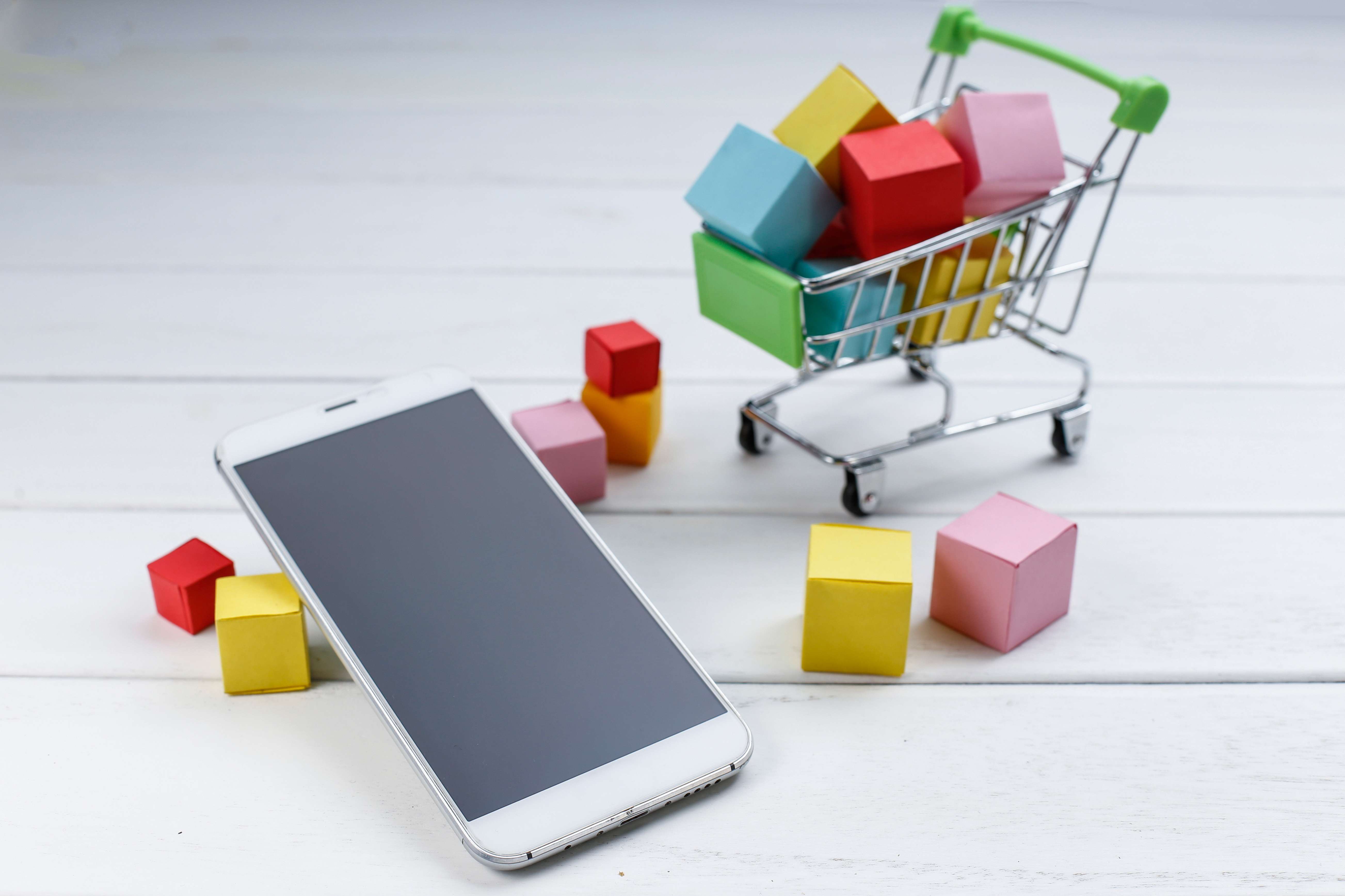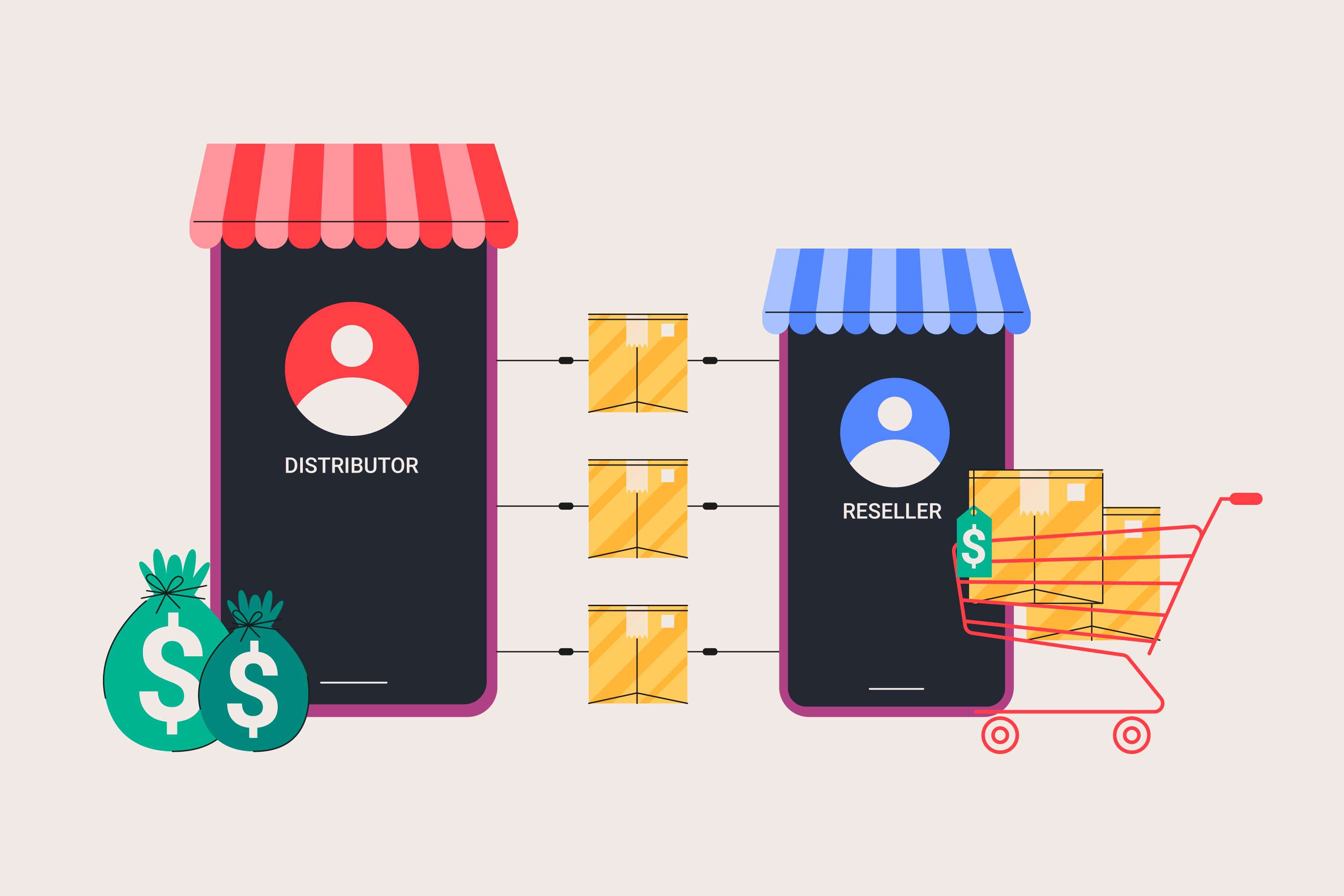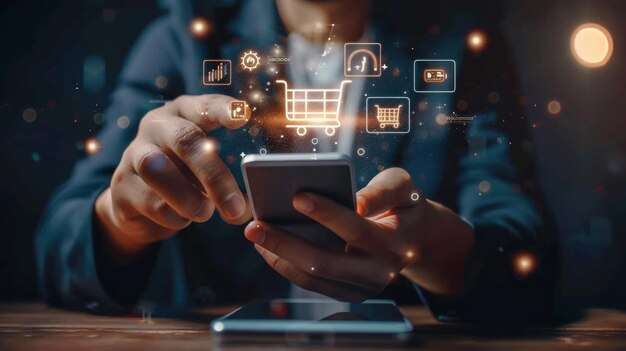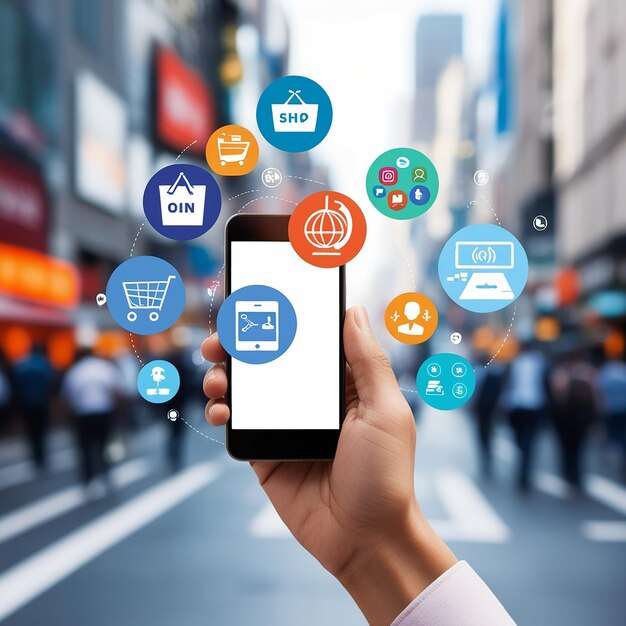1.Creating Personalized M-Commerce Apps
The secret to a personalized mobile purchasing experience is custom M-Commerce app development. Creating apps tailored to your business needs will enhance the user experience and improve client loyalty and retention. Better integration with your current infrastructure and outside services is another benefit of using custom apps, which can streamline processes and increase productivity.
Custom M-Commerce apps offer the following main advantages:
- Customized to meet your brand's unique requirements
- Improved client interaction and retention
- Enhanced operational effectiveness
- Easy connection to external services


2.Mobile Commerce Solutions India
India's mobile commerce solutions are revolutionizing the way businesses interact with their clients. Retailers may now offer individualized shopping experiences and reach a wider audience thanks to the quick adoption of smartphones. M-Commerce apps increase sales and boost consumer happiness by providing a quick, easy, and safe way to shop.
Mobile commerce solutions provide numerous advantages, such as:
- Mobile devices provide a broad client reach
- Customized and captivating retail encounters
- Safe payment gateways ensure smooth transactions
- Increased revenue and client satisfaction
3.Development of Retail Mobile Applications
For companies trying to offer a seamless and effective shopping experience, retail mobile app development is crucial. With a well-designed app, retailers can provide immediate product access, targeted promotions, and real-time information from the comfort of a mobile device. Retailers can enhance engagement and drive revenue with features like location-based marketing and push alerts.
Retail mobile apps include:
- Real-time product updates and promotions
- Tailored purchasing advice
- Push alerts for deals and changes
- Targeted outreach using location-based marketing


4.Retail Brands' M-Commerce Application
Retail firms' M-Commerce apps are turning into an essential tool for maintaining their competitiveness. Customers may buy with convenience and flexibility with these apps, which prioritize mobile devices. M-Commerce apps improve the customer experience from beginning to end with features like order tracking, secure payments, and product catalogs.
The distinguishing features of retail M-Commerce apps include:
- Sophisticated product catalogs and search capabilities
- Real-time order tracking and alerts
- Secure payment and checkout procedures
5.Designing Smartphone Shopping Apps
Developing a user-friendly and intuitive experience for customers is the main goal of mobile shopping app design. An app with a strong design makes it easier to use, which increases sales by motivating users to spend more frequently. A mobile shopping app that prioritizes responsive design, simple navigation, and rapid load times can increase user engagement and happiness.
The best practices for creating mobile commerce apps are as follows:
- Simple navigation and design
- Quick loading times for optimum efficiency
- The adaptive design is suitable for a variety of devices
- Eye-catching images and easy-to-use product browsing


6.Create a Safe M-Commerce App
When developing M-Commerce apps, security is of utmost importance. Retailers are required to guarantee that payment information, personal information, and customer data are safe from online attacks. M-Commerce apps may offer a secure purchasing experience by using strong encryption, authentication, and secure payment channels.
The main security elements of M-Commerce apps include:
- End-to-end encryption for data protection
- Multi-factor authentication for secure access
- PCI-compliant payment gateways
- Consistent security evaluations and upgrades
7.Capable Platforms for Mobile Commerce
Businesses may expand limitlessly with scalable mobile commerce solutions. App Developers India Provides M-Commerce software needs to be able to manage more orders, traffic, and user engagement as your clientele grows. With a scalable platform, you can guarantee that your app will function smoothly even at times of high demand without compromising on performance.
Scalable M-Commerce platform advantages include:
- Adjusts effectively to heightened customer traffic
- Maintains functionality during peak sales
- Versatile design to accommodate future expansion
- Affordable options for scaling


8.Converting E-Commerce to M-Commerce
For businesses adapting to the mobile-first environment, moving from e-commerce to M-commerce is essential. Switching from traditional e-commerce App Development platforms to mobile-friendly M-Commerce apps offers a more efficient and optimized purchasing experience, as more consumers turn to their smartphones for their shopping needs.
When transitioning from e-commerce to M-commerce, consider the following key factors:
- Shopping experiences tailored for mobile
- Simplified navigation and checkout procedures
- Design adapts to different screen sizes
- Optimized mobile advertising techniques
9.M-Commerce Mobile Payments Integration
Mobile payment integration is a vital component of any successful M-Commerce app. Providing safe and practical payment options, such as card payments, UPIs, and digital wallets, simplifies customers' transactions. Businesses may achieve higher conversion rates by offering a variety of payment methods.
The main advantages of integrating mobile payments include:
- Convenient payment choices for clients
- Secure transactions with encryption
- Quick checkout reduces cart abandonment
- Supports a variety of payment options, including cards, wallets, and UPI

don't trust what I say
use our FREE TRIAL service and see it yourself.
Technology-based development our developers do
Our software engineers are well-versed in various technologies to provide unique solutions based on your project’s needs. Some of the technology-based development services we provide include -

1. .NET Software Development
As the best software development company in India, we offer .NET software development solutions to help you build high-performing applications for mobile, web, and desktop. Our .NET development team is well-versed in handling multiple projects with unique requirements.

2. Python Software Development
Our team of expert software engineers in India understands the versatility of Python and is well-versed in utilizing it to develop high-end software products. Our Python development team builds solutions that are efficient, reliable, and tailored to your unique requirements.

3. PHP Software Development
We have a team of the best software developers in India to provide full-featured PHP development services. We help you build high-performing web applications that are scalable and provide a great user experience.

4. Node.js Software Development
With a team of top software engineers in India, we offer Node.js software development services to help you build fast, scalable, and high-performing web applications. Our experts have delivered multiple top-quality Node.js projects that set new industry standards.

5. Mobile App Development (iOS/Android)
We have a team of the best mobile app developers in India to offer end-to-end mobile app development services from wireframing to deployment. Our expertise extends to both Android and iOS, and we have consistently delivered lightweight apps with the best user experience.

6. Angular Software Development
As a reputable software development company in India, we offer Angular software development services to build highly interactive and dynamic web applications. Our expert software developers deliver robust Angular applications that offer users a responsible interface.

7. React Software Development
Our team of expert software developers in India uses React to deliver stable, robust, and scalable software solutions. We develop interactive user interfaces to provide a visually stunning and high-functioning user experience.

8. Laravel Software Development
Our Laravel software development services are suitable for any type of business application, such as CRM, eCommerce, SaaS, and CMS solutions. We utilize Laravel to develop visually appealing, highly scalable, and robust applications much faster.

9. MEAN/MERN Stack Development
Our expert Indian software developers use MEAN and MERN stack development to build highly efficient feature-rich webs. We deliver highly immersive experiences by creating user-friendly web portals, highly interactive software applications, and scalable APIs by leveraging various tools offered by MEAN and MERN Stack.

10. Django Software Development
As a leading software development company in India, we offer Django software development services to businesses of all sizes in various niches. We utilize Django, which is used to power YouTube, Instagram, and Pinterest, to provide tailor-made solutions that fit your business requirements.

11. Kotlin Software Development
Our team of expert software developers in India provides Kotlin software development services, offering a smooth transition from Java with enhanced code quality. We build high-speed and high-performance mobile applications for any platform with minimal code using Kotlin.

12. Swift Software Development
Our team of top software developers utilizes Swift for iOS app development. Our skilled developers can develop iOS applications from scratch using Swift or add Swift codes into already existing ones successfully so the app runs smoothly on all Apple devices.
List of Mobile Commerce (M-Commerce) Apps
| App Name | Category | Description |
|---|---|---|
| Custom Retail M-Commerce App | Retail | A tailored app for single-brand retail stores offering seamless product browsing, secure payments, and customer engagement features. |
| Mobile Payment Integration App | Finance | An app that integrates various mobile payment methods such as UPI, wallets, and card payments for smooth transactions. |
| Order Tracking App | Logistics | Allows customers to track their orders in real-time, enhancing transparency and customer satisfaction. |
| Loyalty Program M-Commerce App | Retail/Rewards | Offers loyalty programs, rewards, and exclusive discounts to retain and engage customers through mobile platforms. |
| Location-Based Marketing App | Marketing | Sends push notifications and personalized offers based on the customer's location, driving local engagement and sales. |
| Product Catalog App | Retail | Displays a comprehensive, searchable product catalog with filtering options for a seamless mobile shopping experience. |
| Subscription-Based M-Commerce App | Subscription Services | Manages recurring payments and subscription services, offering users the convenience of automatic billing and delivery options. |
| Multi-Vendor M-Commerce App | Marketplace | Connects various sellers and buyers on a single platform, offering a wide range of products and seamless checkout. |
Sellers Screens for Mobile Commerce (M-Commerce) Apps
| Screen | Features | Description |
|---|---|---|
| Login & Registration | Social Login, Email/Password, OTP Verification | Sellers can create an account or log in using their email, phone number, or social media. OTP verification ensures security during the login process. |
| Dashboard | Overview of Sales, Orders, Revenue, and Analytics | The dashboard provides a quick snapshot of the seller's business, showing sales trends, total orders, revenue, and key performance indicators. |
| Product Management | Add/Update/Delete Products, Categories, Stock Levels | Sellers can manage their product listings, update details such as price, description, stock levels, and categorize products for easier navigation. |
| Order Management | View Orders, Track Status, Update Shipping Details | This screen allows sellers to manage all customer orders, track order status, update shipping information, and notify customers. |
| Inventory Management | Stock Alerts, Low Stock Notifications, Reorder Levels | Sellers can keep track of product inventory, set alerts for low stock levels, and manage reorder processes to prevent stockouts. |
| Payments & Transactions | View Payment History, Payouts, Earnings Summary | This screen displays all payment-related information, including payment history, total earnings, and pending payouts to the seller. |
| Shipping & Logistics | Shipping Partners, Shipping Status, Update Tracking | Sellers can manage their shipping process, update tracking numbers, and connect with shipping partners to ensure timely deliveries. |
| Customer Communication | In-App Messaging, Support Tickets, Push Notifications | Sellers can communicate directly with customers via in-app messaging, respond to queries, and manage customer support tickets. |
| Sales Reports & Analytics | Custom Reports, Download Data, Sales Trends | Provides detailed sales reports and analytics, allowing sellers to download data, view sales trends, and generate custom reports. |
| Settings & Profile Management | Update Profile, Manage Store Settings, Notifications | Sellers can manage their personal profiles, store settings, notifications, and preferences related to their M-Commerce store. |
Buyers Screens forMobile Commerce (M-Commerce) Apps
| Screen Name | Features | Explanation |
|---|---|---|
| Login / Signup Screen |
|
This screen allows users to log in or create an account to access personalized shopping experiences. |
| Home Screen |
|
The home screen presents users with top products, promotions, and a search function to browse the catalog. |
| Product Listing Screen |
|
This screen displays product listings based on selected categories or search results, with sorting and filtering capabilities. |
| Product Detail Screen |
|
Users can view detailed information about a selected product, including price, reviews, and add it to their cart or wishlist. |
| Cart Screen |
|
This screen shows all the items in the user’s cart, allowing them to modify quantities, remove products, and proceed to checkout. |
| Checkout Screen |
|
The checkout screen allows users to select a delivery address, choose a payment method, and review their order before placing it. |
| Order Confirmation Screen |
|
After placing an order, users receive confirmation with details about their purchase, estimated delivery, and tracking options. |
| Order Tracking Screen |
|
This screen provides users with live updates on the status of their orders, including tracking and delivery timelines. |
| Wishlist Screen |
|
Users can save products they are interested in and move them to the cart when ready to purchase. |
| Profile Screen |
|
Users can manage their account details, addresses, and payment methods on the profile screen. |
| Notification Center |
|
The notification center provides alerts on new offers, updates on orders, and other app-related news. |
Admin Pannel Screens for Mobile Commerce (M-Commerce) Apps
| Screen Name | Features | Description |
|---|---|---|
| Dashboard |
|
Provides a comprehensive overview of sales, key performance metrics, and recent activities within the app. Helps administrators quickly assess the app's performance. |
| Product Management |
|
Allows administrators to manage product listings, including adding new products, editing existing ones, and deleting them. Also includes features for managing categories and tracking inventory levels. |
| Order Management |
|
Provides tools for viewing and updating the status of customer orders. Includes functionality for handling returns and processing refunds. |
| Customer Management |
|
Enables administrators to view and edit customer profiles, and manage support tickets to address customer inquiries and issues. |
| Promotions and Discounts |
|
Allows for the creation and management of discount codes and promotional campaigns. Includes features to view the performance and effectiveness of promotions. |
| Reports and Analytics |
|
Generates various reports and analytics, including sales performance, customer behavior, and product statistics. Helps in data-driven decision making. |
| Settings |
|
Provides options to configure app settings, manage user accounts, and integrate or update payment gateways. |
| Notifications |
|
Allows administrators to view and manage notifications sent to users. Includes options to customize notification preferences and send bulk notifications. |
| Content Management |
|
Enables administrators to manage in-app banners, advertisements, and other content. Includes features for editing text content and uploading media files. |
Estimated Cost Breakdown for Mobile Commerce (M-Commerce) Apps
The cost of developing a Mobile Commerce (M-Commerce) app varies based on several factors such as complexity, features, and the development team's location. Below is a general breakdown of the estimated costs involved in creating a comprehensive M-Commerce app.
| Component | Description | Estimated Cost (USD) |
|---|---|---|
| App Design | Includes user interface (UI) and user experience (UX) design, wireframes, and visual design. | $5,000 - $10,000 |
| Front-End Development | Development of the client-side of the app, including layout, navigation, and user interactions. | $10,000 - $20,000 |
| Back-End Development | Server-side development, including database management, server logic, and API integrations. | $15,000 - $30,000 |
| Payment Integration | Integration of various payment gateways like credit cards, digital wallets, and UPI. | $2,000 - $5,000 |
| Security Features | Implementation of security measures such as encryption, authentication, and secure transactions. | $3,000 - $7,000 |
| Testing and QA | Quality assurance testing to ensure the app is bug-free and performs well across devices. | $4,000 - $8,000 |
| Deployment | Costs associated with app deployment on app stores and server hosting. | $1,000 - $2,000 |
| Maintenance and Updates | Ongoing support, updates, and bug fixes after the initial launch. | $2,000 - $5,000 per year |
Frequently Asked Questions (FAQs)
1. What is a Mobile Commerce (M-Commerce) App?
A Mobile Commerce (M-Commerce) App is a software application designed for mobile devices that allows users to conduct commercial transactions, such as purchasing goods and services, directly from their smartphones or tablets.
2. How does an M-Commerce app differ from a traditional e-commerce app?
An M-Commerce app is optimized for mobile devices, offering features like touch-screen compatibility, GPS integration, and mobile payment options. In contrast, traditional e-commerce apps are often designed for desktop use and may not be fully optimized for mobile experiences.
3. What are the key features of a successful M-Commerce app?
Key features include user-friendly interface, secure payment gateways, personalized recommendations, push notifications, order tracking, and easy navigation.
4. How much does it cost to develop a Mobile Commerce app?
The cost can vary widely depending on the app's complexity, features, and the development team's location. Generally, the development cost ranges from $30,000 to $100,000 or more.
5. What platforms are commonly used for M-Commerce app development?
The most common platforms are iOS and Android. Some apps are developed for both platforms using native development, while others may use cross-platform frameworks.
6. How long does it take to develop an M-Commerce app?
Development time can range from 3 to 6 months or more, depending on the app’s complexity and the development process used.
7. What are the essential security features for an M-Commerce app?
Essential security features include end-to-end encryption, secure payment processing, multi-factor authentication, and regular security updates.
8. How can I ensure a good user experience in my M-Commerce app?
Focus on a simple and intuitive interface, fast load times, easy navigation, and responsive design that adapts to different screen sizes.
9. What is mobile payment integration, and why is it important?
Mobile payment integration allows users to make payments using mobile-friendly methods such as digital wallets, credit/debit cards, and UPI. It is important for providing a seamless and secure transaction experience.
10. Can M-Commerce apps support multiple languages and currencies?
Yes, many M-Commerce apps can be designed to support multiple languages and currencies to cater to a global audience.
11. How do push notifications work in M-Commerce apps?
Push notifications are messages sent to users’ mobile devices to keep them informed about promotions, updates, and order statuses, enhancing user engagement and retention.
12. What role does app design play in M-Commerce app success?
App design is crucial as it impacts user experience, ease of navigation, and overall satisfaction. A well-designed app can lead to higher engagement and increased sales.
13. What are some common challenges in developing M-Commerce apps?
Common challenges include ensuring app security, optimizing performance, integrating with various payment systems, and providing a seamless user experience across different devices.
14. How can I track the performance of my M-Commerce app?
Use analytics tools to monitor metrics such as user engagement, conversion rates, and transaction volumes. This data helps in making informed decisions and improving the app.
15. What are some best practices for marketing an M-Commerce app?
Best practices include leveraging social media, using app store optimization (ASO), running targeted advertising campaigns, and offering incentives like discounts or rewards for new users.
16. Can I integrate social media features into my M-Commerce app?
Yes, integrating social media features can enhance user engagement by allowing users to share products, reviews, and promotions directly from the app.
17. How do I handle customer support within an M-Commerce app?
Implement in-app support features such as live chat, FAQs, and support ticket systems to address customer inquiries and issues efficiently.
18. What is the role of artificial intelligence (AI) in M-Commerce apps?
AI can be used for personalized recommendations, chatbots for customer service, and predictive analytics to understand user behavior and preferences.
19. How important is app maintenance after launch?
Ongoing maintenance is crucial for fixing bugs, updating features, and ensuring compatibility with new operating system versions. Regular updates help keep the app secure and functional.
20. Can M-Commerce apps be integrated with existing e-commerce platforms?
Yes, M-Commerce apps can be integrated with existing e-commerce platforms to synchronize inventory, manage orders, and provide a unified shopping experience across different channels.
Your choice of weapon
Build your Apps for any Platform
We to code. It's our passion










you can also reach us at our given
email address or phone number.







